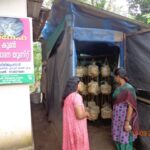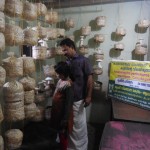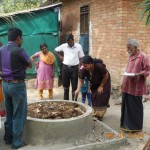Mrs. Girija, Veettuvadakkethil, Evoor (N), Cheppad is an agri diploma holder .Like a majority of women in the state, she has spent most of her life running a household with the meager income. Her life changed when she attended the mushroom cultivation training at the KVK in 2008. She initiated mushroom cultivation with the two packets of spawn purchased from the KVK. Paddy straw collected from the nearby paddy field was used as the substrate. Steam sterilization of paddy straw was followed by polybag method of cultivation. Seeing the first flushes itself she decided to continue it as an income generating enterprise. The whole harvest from these beds was used for household consumption by trying a variety of dishes. She continued mushroom production in the small “pooja room”. The product was marketed among the neighbours and family friends. Her husband, Mr. Prasad’s support and one year experience in this technique, prompted her to construct a shed attached to her house. She started selling 2 – 3 kg mushroom /day @ Rs. 80/kg. She branded her produce in her daughter’s name as , “Sneha koon”. The spurt in demand compelled her to construct one more shed by 2013.
Reduced production and extra care required during summer months affected the regular marketing of oyster mushroom.At this juncture she became a partner in the KVK interventions for on farm testing of milky mushroom – Calocyba gambosa during 2015 – 16. The trial was a success. The demand for this variety is more among hoteliers as it remains firm with a texture similar to chicken and a mushroom flavor after cooking. The market acceptance of mushrooms makes it a viable source of income to her. As a result she started producing and selling 4 – 5 kg mushroom per day @ Rs. 350/kg. She also takes interest in promoting rural youth to take up this venture as an enterprise by sharing her experience.
Organic management of pests and proper disposal of spent substrates helps her to continue this enterprise since 2008. Her product is having huge demand in the market owing to the organic production techniques. She uses the available farm waste for substrate sterilization instead of chemical sterilization so that she can market it in the organic label. The spent substrate is properly utilized for the production of vermicompost which bags her additional income @ Rs. 20/kg and earthworms @ Rs.2/worm. Also the compost is utilized for grow bag cultivation of vegetables for production of safe to eat vegetables at home.
The overall income of about Rs. 15,000/month helps her to take care of the family needs and thus she is proud of the socio – economic status achieved.












